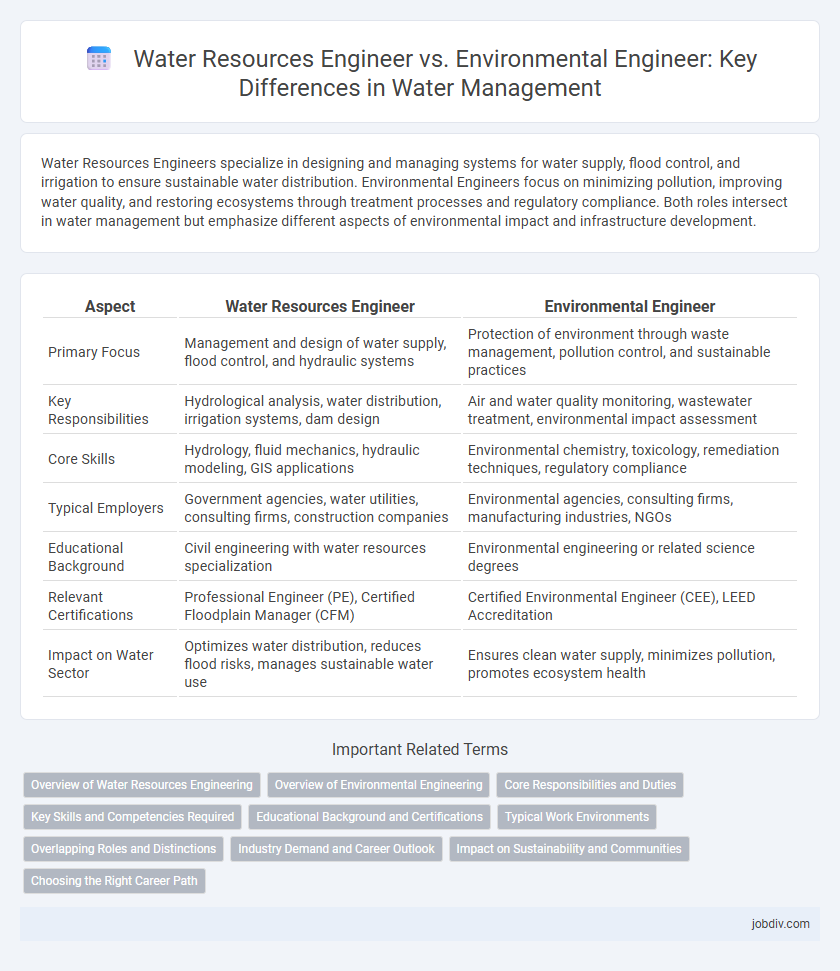Water Resources Engineers specialize in designing and managing systems for water supply, flood control, and irrigation to ensure sustainable water distribution. Environmental Engineers focus on minimizing pollution, improving water quality, and restoring ecosystems through treatment processes and regulatory compliance. Both roles intersect in water management but emphasize different aspects of environmental impact and infrastructure development.
Table of Comparison
| Aspect | Water Resources Engineer | Environmental Engineer |
|---|---|---|
| Primary Focus | Management and design of water supply, flood control, and hydraulic systems | Protection of environment through waste management, pollution control, and sustainable practices |
| Key Responsibilities | Hydrological analysis, water distribution, irrigation systems, dam design | Air and water quality monitoring, wastewater treatment, environmental impact assessment |
| Core Skills | Hydrology, fluid mechanics, hydraulic modeling, GIS applications | Environmental chemistry, toxicology, remediation techniques, regulatory compliance |
| Typical Employers | Government agencies, water utilities, consulting firms, construction companies | Environmental agencies, consulting firms, manufacturing industries, NGOs |
| Educational Background | Civil engineering with water resources specialization | Environmental engineering or related science degrees |
| Relevant Certifications | Professional Engineer (PE), Certified Floodplain Manager (CFM) | Certified Environmental Engineer (CEE), LEED Accreditation |
| Impact on Water Sector | Optimizes water distribution, reduces flood risks, manages sustainable water use | Ensures clean water supply, minimizes pollution, promotes ecosystem health |
Overview of Water Resources Engineering
Water Resources Engineering focuses on the planning, development, and management of water systems to ensure sustainable water supply, flood control, and watershed protection. It involves hydraulic modeling, hydrological analysis, and infrastructure design such as dams, reservoirs, and irrigation systems. In contrast, Environmental Engineering addresses broader environmental challenges, including air and water pollution control, waste management, and ecosystem restoration, with an emphasis on protecting natural resources and public health.
Overview of Environmental Engineering
Environmental engineering focuses on developing sustainable solutions to manage natural resources, control pollution, and protect ecosystems, with an emphasis on water quality, waste management, and air pollution control. Water resources engineers specialize within this field by designing systems to efficiently manage water supply, stormwater, and flood control, ensuring sustainable use and conservation of water resources. This interdisciplinary approach integrates civil engineering, ecology, and chemistry to address complex environmental challenges and promote public health.
Core Responsibilities and Duties
Water Resources Engineers specialize in designing and managing infrastructure for water distribution, flood control, and wastewater treatment to ensure sustainable water supply and mitigate environmental impact. Environmental Engineers focus on protecting human health and ecosystems by developing systems for pollution control, waste management, and environmental remediation, often addressing air, water, and soil quality. Both roles require expertise in regulatory compliance and environmental impact assessments but differ in their primary focus areas--water resources management versus broader environmental protection.
Key Skills and Competencies Required
Water Resources Engineers require advanced skills in hydrology, hydraulic modeling, and watershed management to design efficient water supply and flood control systems. Environmental Engineers focus on expertise in pollution control, environmental impact assessments, and sustainable waste management to protect water quality and ecosystems. Both roles demand proficiency in GIS technology, regulatory compliance, and project management to address complex water-related challenges effectively.
Educational Background and Certifications
Water Resources Engineers typically hold a degree in civil or environmental engineering with a focus on hydraulics, hydrology, and water resource management. Environmental Engineers often graduate with a degree in environmental engineering or science, emphasizing pollution control and sustainable design. Certifications such as Professional Engineer (PE) or Engineer-in-Training (EIT) are common for both, while environmental engineers may also pursue credentials like the Certified Environmental Engineer (CEE) or LEED accreditation.
Typical Work Environments
Water Resources Engineers typically work in government agencies, environmental consulting firms, and construction companies where they manage water supply systems, flood control projects, and hydraulic modeling. Environmental Engineers are often found in regulatory agencies, waste management firms, and industrial plants, focusing on pollution control, environmental compliance, and remediation efforts. Both professions frequently collaborate in urban planning and infrastructure development settings to address sustainable water management challenges.
Overlapping Roles and Distinctions
Water Resources Engineers and Environmental Engineers both address water quality and management but emphasize different aspects; Water Resources Engineers specialize in designing systems for water supply, flood control, and irrigation, while Environmental Engineers focus on pollution control and sustainable practices. Overlapping roles include analyzing hydrological data, assessing environmental impact, and developing regulatory compliance plans related to water systems. Distinctions arise as Water Resources Engineers prioritize hydraulic modeling and infrastructure design, whereas Environmental Engineers concentrate on waste treatment, contamination remediation, and ecosystem protection.
Industry Demand and Career Outlook
Water Resources Engineers focus on the design and management of systems that control water flow, flood prevention, and sustainable water supply, with industry demand driven by infrastructure development and climate resilience projects. Environmental Engineers address broader environmental challenges, including water quality, waste management, and pollution control, which positions them favorably in government agencies and private sectors prioritizing regulatory compliance and sustainability. Career outlook for Water Resources Engineers shows steady growth due to urban expansion and aging infrastructure, while Environmental Engineers experience robust demand linked to increasing environmental regulations and corporate sustainability initiatives.
Impact on Sustainability and Communities
Water Resources Engineers design and manage systems for efficient water use, focusing on sustainable supply, flood control, and infrastructure resilience, directly supporting community water security. Environmental Engineers address pollution control, habitat restoration, and water quality protection, promoting healthier ecosystems and safeguarding public health in communities. Both roles contribute to sustainability by integrating technological solutions with ecological and social considerations to ensure long-term water resource availability and environmental integrity.
Choosing the Right Career Path
Water resources engineers specialize in designing systems for managing water supply, flood control, and irrigation, focusing on hydrology, hydraulic modeling, and infrastructure development. Environmental engineers concentrate on pollution control, waste management, and sustainable practices to protect ecosystems and public health. Choosing the right career depends on your interest in either managing water systems and infrastructure or addressing environmental challenges through regulatory compliance and remediation.
Water Resources Engineer vs Environmental Engineer Infographic

 jobdiv.com
jobdiv.com